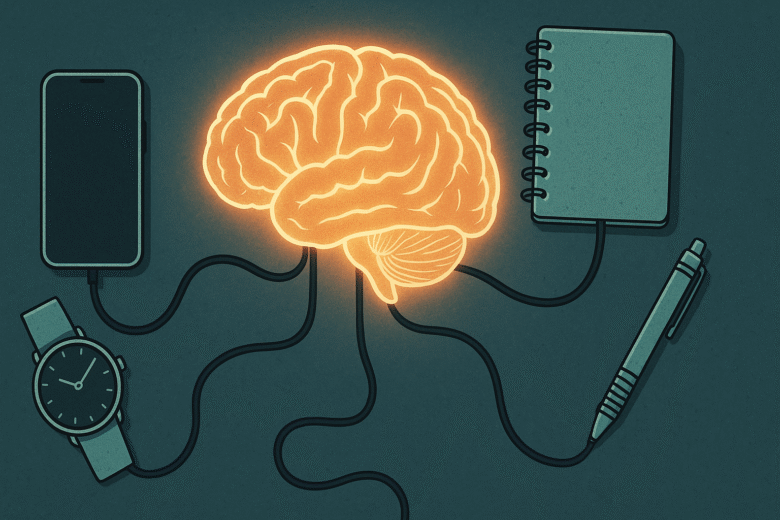Fun fact: When you count on your fingers, you’re literally expanding your brainpower beyond your skull.
We tend to imagine the brain as a self-contained control centre, a wrinkled lump of Gray matter doing all the heavy lifting inside our skulls. But what if that’s not the full picture? What if your “mind” isn’t locked inside your head at all? Welcome to the world of distributed cognition, a provocative idea that suggests your brain might be much bigger than your skull—and that you’ve been outsourcing your thinking all along.
The Brain Beyond the Skull
The phrase “distributed cognition” sounds like academic jargon, but the idea is simple: thinking doesn’t just happen in your head. It’s spread out—into your body, your tools, your social networks, and even your environment.
Think of how you remember a phone number. Chances are, you don’t. Your smartphone does. You’ve outsourced memory. That grocery list on the fridge, the calculator app, the GPS map—all these extend your mind.
Psychologist Edwin Hutchins, who studied ship navigation, showed how no single sailor could steer a massive vessel alone. Instead, cognition was distributed across crew members, charts, instruments, and communication systems. In other words, the “thinking” wasn’t confined to one brain—it lived in the network.
So, is your mind actually a team sport?
Everyday Evidence: How You Already Do It
Let’s look closer at everyday life:
Sticky Notes & Reminders: You don’t keep every task in working memory. You externalize it onto Post-its or apps. Your desk is essentially your backup drive.
Finger Counting: Ancient humans developed numerical systems hand-in-hand (literally) with finger counting. Even today, kids gesture while learning math—it helps them think.
Google & Wikipedia: The web is your extended hippocampus. If the internet vanished tomorrow, how much of your “knowledge” would collapse?
Social Cognition: You consult friends before making big decisions. “What do you think?” isn’t just politeness—it’s distributed problem-solving.
Without realizing it, we rely on a hybrid system: neurons inside, tools outside. Together, they form a bigger, messier “brain.”
Case Studies: Where Distributed Cognition Shows Its Power
- Airplane Cockpits
Pilots don’t fly planes alone in their heads. Buttons, sensors, copilots, and automated systems all interact to form a thinking environment. When accidents happen, it’s often because this network breaks down—not because one brain failed. - Classrooms
A blackboard is more than a teaching aid—it’s an external cognitive surface. Students and teachers write, erase, and connect ideas in ways memory alone couldn’t handle. - Sports Teams
Think about football. No single player holds the “strategy.” It lives in the team’s communication, patterns, and collective coordination. A goal is scored by distributed cognition in motion. - Modern Life Hacks
Ever used Google Maps to navigate your own neighbourhood? That’s not laziness—it’s dependence on an external navigation system. The trade-off? Your internal maps shrink.
The Upside: Freedom From Limits
Distributed cognition allows humans to pull off tasks our skull-sized brains could never handle solo:
Scale: You can manage massive projects because tasks are spread across teams and tools.
Precision: Calculators outdo mental math; MRI machines see what eyes can’t.
Creativity: Brainstorming with others creates connections no single mind would spark.
In short: you’re smarter with your environment than without it.
The Downside: Are We Outsourcing Ourselves Away?
Here’s the uncomfortable part. If your mind extends into your tools, then losing those tools means losing part of your brain.
Digital Amnesia: Studies show people remember less if they know they can Google it later.
GPS Dependency: London cab drivers once developed famously enlarged hippocampi (the brain’s map centre) by memorizing streets. Now, GPS erases that workout.
Attention Hijacking: Social media platforms (like Meta, which owns Facebook and Instagram, and X, formerly Twitter) don’t just host your cognition—they manipulate it, nudging what you think about.
When companies hold your extended brain, who really controls your thoughts?
A Provocative Question: Who Owns Your Mind?
If cognition is distributed, your brain isn’t entirely yours. It’s shared with apps, corporations, and even governments. That’s unsettling. Imagine if your external memory (Google Drive, WhatsApp chats, cloud photos) were wiped tomorrow. If it vanished, would you still be “you,” or would a piece of your mind be missing?
Distributed cognition is empowering, yes, but it also raises new dangers. Our ancestors risked forgetting myths if an elder died. A server crash could wipe out chunks of our memory.
Conclusion: Think Outside Your Head
Distributed cognition teaches us that the boundaries of the mind are porous. Your skull is just one vessel among many. Pens, smartphones, classrooms, and communities—they’re all thinking partners.
So next time you scribble a note, Google a fact, or ask a friend for advice, realize: you’re not just using your brain—you’re expanding it.
Maybe the real measure of intelligence isn’t the size of your skull, but the reach of your network.
Author’s Note
Writing this piece made me rethink how much of my own brain lives in my phone. Perhaps the scariest part is not that our minds are distributed—but that we rarely stop to notice who we’ve handed the pieces to.
G.C., Ecosociosphere contributor.
References and Further Reading
- Hutchins, E. Cognition in the Wild. MIT Press, 1995.
- Clark, A. & Chalmers, D. “The Extended Mind.” Analysis, 1998.
- Stanford Encyclopedia of Philosophy – Distributed Cognition
- The Extended Mind Thesis – Internet Encyclopedia of Philosophy
- How the human brain folds itself up | New Scientist
- Our Cosmic Blind Spots | Keith Giles – Patheos
- What If the Internet Vanished Tomorrow? | MicroLearningWithMe
- Practical applications of creating a thinking environment – YouTube
- Digital Amnesia: Are We Forgetting Ourselves in the Age of Google?




